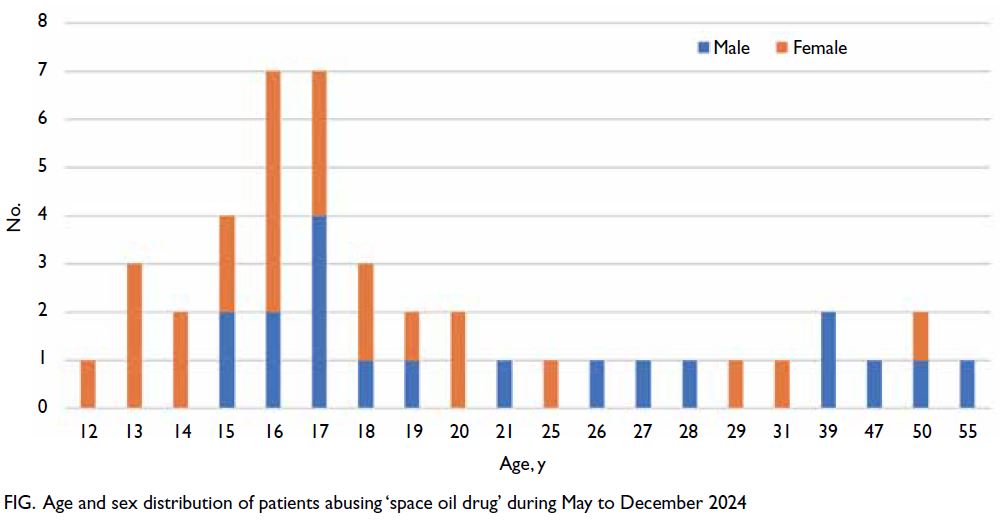Hong Kong Med J 2025;31:Epub 8 Apr 2025
© Hong Kong Academy of Medicine. CC BY-NC-ND 4.0
LETTER TO THE EDITOR
Spread of ‘space oil drug’ (etomidate) abuse in Hong Kong and consequent emergency department presentations
Irene NK Wong, FHKAM (Emergency Medicine)1; CK Chan, FHKAM (Emergency Medicine)2; ML Tse, FHKAM (Emergency Medicine)2
1 Department of Accident and Emergency, Pamela Youde Nethersole Eastern Hospital, Hong Kong SAR, China
2 Hong Kong Poison Control Centre, Hospital Authority, Hong Kong SAR, China
Corresponding author: Dr ML Tse (tseml@ha.org.hk)
To the Editor—The abuse of ‘space oil drug’
rapidly spread in Hong Kong throughout 2024,1
particularly among adolescents. ‘Space oil drug’
contains etomidate and/or its analogues, propoxate
and isopropoxate, dissolved in solvents for abuse
through e-cigarettes. It may also be mixed with
other dangerous drugs such as cocaine and
methamphetamine.2 Etomidate is a gamma-aminobutyric
acid–agonist with ultra–short-acting
sedative effect that is often used in anaesthesia
induction and emergency intubation.
From May to December 2024, the Hong
Kong Poison Control Centre recorded 45 cases of
‘space oil drug’ abuse presenting to the Hospital
Authority emergency departments. Patient ages
ranged from 12 to 55 years, with a median of 17
years, and the male-to-female ratio was 1:1.3 (Fig).
The reported clinical features of presentation to
emergency departments included confusion (n=16),
tremor (n=10), unsteady gait (n=7), associated falls
and injuries (n=4), syncope (n=4), and myoclonus
(n=2). Most neurological symptoms resolved within
hours. Hypokalaemia was observed in 62% of these
presentations with a median serum concentration of
potassium of 3.4 mmol/L (lowest=2.1). Four patients required intensive care, and three associated deaths were recorded.
Etomidate can cause adrenal dysfunction
by inhibiting 11-beta-hydroxylase and 17-alpha-hydroxylase.
It can also increase adrenal androgen
production and may cause menstrual disorders and
hirsutism in women.2
Clinicians should remain vigilant for hidden
‘space oil drug’ abusers. According to our findings,
they were usually young with a history of e-cigarette
use. They commonly presented acutely with
transient neurological symptoms and unexplained
hypokalaemia. Chronic abusers might have frequent
falls and injuries while female abusers might also
develop menstrual disorders and hirsutism. A
multidisciplinary effort is required to halt the spread
of ‘space oil drug’ abuse and to provide appropriate
care for the abusers.
Author contributions
All authors contributed to the letter and critical revision of
the letter for important intellectual content. All authors had
full access to the data, contributed to the study, approved the
final version for publication, and take responsibility for its
accuracy and integrity.
Conflicts of interest
All authors have disclosed no conflicts of interest.
Funding/support
This letter received no specific grant from any funding agency in the public, commercial, or not-for-profit sectors.
References
1. Narcotics Division, Security Bureau, Hong Kong SAR
Government. Central Registry of Drug Abuse (CRDA).
Main charts/tables. Available from: https://www.nd.gov.hk/en/crda_main_charts_and_tables.html. Accessed 24 Dec 2024.
2. Cheung YT, Yeung CW, Yu KY, Lau CY, Tong HF, Chong YK.
A recent increasing occurrence of etomidate and propoxate/isopropoxate misuse. Clin Toxicol (Phila) 2025;63:65-7. Crossref


